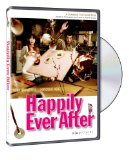| Reviews & Columns |
|
Reviews DVD TV on DVD Blu-ray 4K UHD International DVDs In Theaters Reviews by Studio Video Games Features Collector Series DVDs Easter Egg Database Interviews DVD Talk Radio Feature Articles Columns Anime Talk DVD Savant Horror DVDs The M.O.D. Squad Art House HD Talk Silent DVD
|
DVD Talk Forum |
|
|
| Resources |
|
DVD Price Search Customer Service #'s RCE Info Links |
|
Columns
|
|
|
Happily Ever After
VIZ // Unrated // May 12, 2009
List Price: $24.98 [Buy now and save at Amazon]
The Film:
Yukihiko Tsutsumi's Happily Ever After, aka Jigyaku no uta, is about flying food, violent headbutts, and the sad story of a shunned girl named Yukie (Miti Nakatoni, When the Last Sword is Drawn) who would grow up to expect nothing better from her life. Reminiscent of The Taste of Tea from director Katsuhito Ishii, it's a semi-surreal relationship tale focusing on the enraged slow-motion flipping of tables and quirky slapstick sensibilities as its bread and butter. As it approaches the core of the narrative, it illustrates how a young girl could possibly come to understand the brute nature of a caveman-like lover -- building into a tonally uneven yet pleasing screwball drama.
Loosely based on a Japanese manga, this half-silly, half-sweet collage of sappy emotions is a harmless enough story of how Yukie and her ex-Yakuza lover, Isao (Hiroshi Abe, Chocolate), go about their day-to-day lives. She works all day at a restaurant as the bread winner, then comes home to prepare food well enough to ward off his anger. Isao comes home after a workless day of gambling and stone-faced grunting on Yukie's dime, then finds some reason to flip out -- literally. He flips their little table, usually topped with the dinner that Yukie made, in a fit of anger over minuscule grievances.
Obviously, Isao's not our hero. Around every corner, Yukie's acquaintances are harping on her to leave him -- and we have no idea why she'd possibly want to stay with him. It's at the halfway point in Happily Ever After that we learn why; we're taken back in time to Yukie's life as a grade school outcast, showing how she developed her easily defeated attitude, then taken towards her adult life to introduce us to the union between her and Isao. She embellishes their past relationship, standing up for him in ways that seem unreasonable. Then again, who hasn't seen someone locked in a relationship with someone undeserving and heard the inevitable "they're not always like that" type of speech?
At first glance, Happily Ever After is a pleasant little juvenile comedy lying atop a problematic premise. Watching the food fly in Isao's multiple table-flipping scenes can be rather funny, becoming repetitive in a way that sets up even more humor between him and Yukie. Each one is filmed in deep slow-motion overload, which brings out both the energy in the scene as well as the facial reactions from the two leads. Hiroshi Abe's distinctive glare works well for Isao, as they reveal a hint of something deeper underneath his fervor. The secondary characters -- an old woman keeping track of Isao and Yukie's spats, Isao's cronies, as well as Yukie's boss and father -- also add dashes of individuality to the environment, a largely colorful sprinkling of locations and people that accentuate Happily Ever After's somewhat hard-faced humor.
Then, at the center of the film's core conflict, Happily Ever After makes a tonal about-face, stripping its attitude cleanly of humor by diving into the gloomy corners of Yukie's childhood. Slapstick, situational comedy abruptly transforms into rigid childhood drama, performed fine enough for the young cast but handled in a way that displaces the loony demeanor at the front. Poverty, scornful glances from the other kids, and a desire for Yukie to be somebody else other than herself all fit snugly into this dour stretch. Exposing her history spices up her character motivations, but the break in mood hurts the film's flow.
It's only with the last quarter of Happily Ever After, the stretch covering Yukie's early adulthood, that Miti Nakatoni really blossoms as Yukie. She, as a character, doesn't stand out much throughout the first half of the film, even though she falls under our gaze as the direct focus of all the hustle-bustle. Some sympathy arises for her as we absorb her shy cuteness and admirers, sure, but she surrenders any emotional investment to the audience's aggravation with Isao. This changes on purpose later on, as we begin to see the reality behind Yukie's life take shape through flashbacks to her past.
Happily Ever After comes together into odd marriage of two different tones, somewhat colliding together into a peculiar clash of a conclusion that's both overwhelmingly sweet and stilted with equal breaths. It's still satisfying, none the less; after all the chaos director Yukihiko Tsutsumi pushes on us with soaring tables and high-pitched bickering, it's nice to enjoy such a pleasant, tie-up-with-a-pretty-bow perfect conclusion -- even if it's on the verge of absurdity. Still, this is certainly the funniest film out there involving spontaneous table-tossing.
The DVD:
Viz Pictures presents Happily Ever After in a relatively bare-boned package, only containing a few Trailers for both the film and other Viz products. A Booklet is also included with some Japanese culture notes, attractively designed in two-fold fashion.
Video and Audio:
Similar to Viz Pictures other releases, Happily Ever After comes equipped with a very strong 1.85:1 anamorphic widescreen transfer. It leans a shade or two on the dusty, tan-drenched side and blurry on quite a few occasions, but the range of colors available pop with a lot of energy. Grains against the floor and intricacy within the pachinko machines in Isao's main gambling haunt all stands true with fine detail, exhibiting only negligible edge enhancement and minor digitization against backgrounds. It's a very pleasing, natural presentation, keeping skin tones and set design strong within attractive comedy-drama style photography.
The surprise actually comes in the Japanese Dolby Digital 5.1 audio, which exhibits more surround activity than expected. While vocal strength stands firmly and musical accompaniment pairs well with the design, it's in the flying saucers and tossed furniture that the track shows off some aggressiveness. Sound effects stretch to the back, and in rather robust fashion during these scenes. They also showcase some dimensionality during other sequences, such as train noises and the like. Though most of the sound design sticks front-side, some nice touches are added to give it a robustness. A like-minded Japanese 2.0 track is also available, while Removable English subs are the only title options available.
Final Thoughts:
Silly com-dram at the front then more serious at the center, Happily Ever After pokes fun at a disjointed couple then tries to backpedal into seriousness near the end. It blends in very hit-and-miss fashion, but there's still a undeniably sweet rhythm about Isao and Yukie's dynamic that gives it a satisfying disposition. Though the childhood drama mixes a little strangely with the mostly screwball beginning, it's still a Recommended Japanese comedic drama with plenty of entertainment value.
Thomas Spurlin, Staff Reviewer -- DVDTalk Reviews | Personal Blog/Site
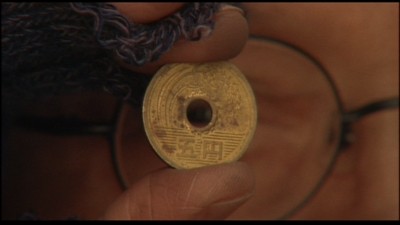 |
Loosely based on a Japanese manga, this half-silly, half-sweet collage of sappy emotions is a harmless enough story of how Yukie and her ex-Yakuza lover, Isao (Hiroshi Abe, Chocolate), go about their day-to-day lives. She works all day at a restaurant as the bread winner, then comes home to prepare food well enough to ward off his anger. Isao comes home after a workless day of gambling and stone-faced grunting on Yukie's dime, then finds some reason to flip out -- literally. He flips their little table, usually topped with the dinner that Yukie made, in a fit of anger over minuscule grievances.
Obviously, Isao's not our hero. Around every corner, Yukie's acquaintances are harping on her to leave him -- and we have no idea why she'd possibly want to stay with him. It's at the halfway point in Happily Ever After that we learn why; we're taken back in time to Yukie's life as a grade school outcast, showing how she developed her easily defeated attitude, then taken towards her adult life to introduce us to the union between her and Isao. She embellishes their past relationship, standing up for him in ways that seem unreasonable. Then again, who hasn't seen someone locked in a relationship with someone undeserving and heard the inevitable "they're not always like that" type of speech?
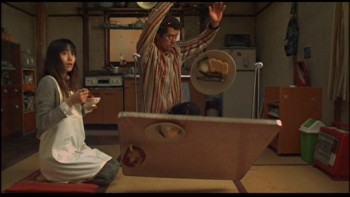 | 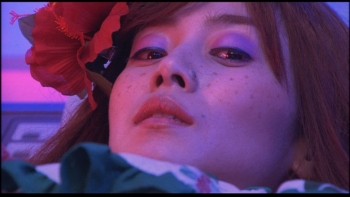 |
At first glance, Happily Ever After is a pleasant little juvenile comedy lying atop a problematic premise. Watching the food fly in Isao's multiple table-flipping scenes can be rather funny, becoming repetitive in a way that sets up even more humor between him and Yukie. Each one is filmed in deep slow-motion overload, which brings out both the energy in the scene as well as the facial reactions from the two leads. Hiroshi Abe's distinctive glare works well for Isao, as they reveal a hint of something deeper underneath his fervor. The secondary characters -- an old woman keeping track of Isao and Yukie's spats, Isao's cronies, as well as Yukie's boss and father -- also add dashes of individuality to the environment, a largely colorful sprinkling of locations and people that accentuate Happily Ever After's somewhat hard-faced humor.
Then, at the center of the film's core conflict, Happily Ever After makes a tonal about-face, stripping its attitude cleanly of humor by diving into the gloomy corners of Yukie's childhood. Slapstick, situational comedy abruptly transforms into rigid childhood drama, performed fine enough for the young cast but handled in a way that displaces the loony demeanor at the front. Poverty, scornful glances from the other kids, and a desire for Yukie to be somebody else other than herself all fit snugly into this dour stretch. Exposing her history spices up her character motivations, but the break in mood hurts the film's flow.
It's only with the last quarter of Happily Ever After, the stretch covering Yukie's early adulthood, that Miti Nakatoni really blossoms as Yukie. She, as a character, doesn't stand out much throughout the first half of the film, even though she falls under our gaze as the direct focus of all the hustle-bustle. Some sympathy arises for her as we absorb her shy cuteness and admirers, sure, but she surrenders any emotional investment to the audience's aggravation with Isao. This changes on purpose later on, as we begin to see the reality behind Yukie's life take shape through flashbacks to her past.
Happily Ever After comes together into odd marriage of two different tones, somewhat colliding together into a peculiar clash of a conclusion that's both overwhelmingly sweet and stilted with equal breaths. It's still satisfying, none the less; after all the chaos director Yukihiko Tsutsumi pushes on us with soaring tables and high-pitched bickering, it's nice to enjoy such a pleasant, tie-up-with-a-pretty-bow perfect conclusion -- even if it's on the verge of absurdity. Still, this is certainly the funniest film out there involving spontaneous table-tossing.
The DVD:
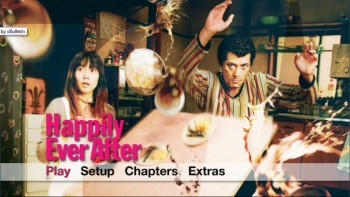 | 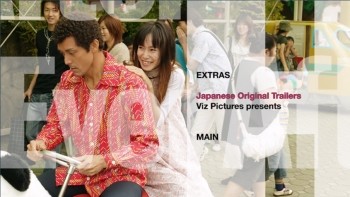 |
Viz Pictures presents Happily Ever After in a relatively bare-boned package, only containing a few Trailers for both the film and other Viz products. A Booklet is also included with some Japanese culture notes, attractively designed in two-fold fashion.
Video and Audio:
Similar to Viz Pictures other releases, Happily Ever After comes equipped with a very strong 1.85:1 anamorphic widescreen transfer. It leans a shade or two on the dusty, tan-drenched side and blurry on quite a few occasions, but the range of colors available pop with a lot of energy. Grains against the floor and intricacy within the pachinko machines in Isao's main gambling haunt all stands true with fine detail, exhibiting only negligible edge enhancement and minor digitization against backgrounds. It's a very pleasing, natural presentation, keeping skin tones and set design strong within attractive comedy-drama style photography.
The surprise actually comes in the Japanese Dolby Digital 5.1 audio, which exhibits more surround activity than expected. While vocal strength stands firmly and musical accompaniment pairs well with the design, it's in the flying saucers and tossed furniture that the track shows off some aggressiveness. Sound effects stretch to the back, and in rather robust fashion during these scenes. They also showcase some dimensionality during other sequences, such as train noises and the like. Though most of the sound design sticks front-side, some nice touches are added to give it a robustness. A like-minded Japanese 2.0 track is also available, while Removable English subs are the only title options available.
Final Thoughts:
Silly com-dram at the front then more serious at the center, Happily Ever After pokes fun at a disjointed couple then tries to backpedal into seriousness near the end. It blends in very hit-and-miss fashion, but there's still a undeniably sweet rhythm about Isao and Yukie's dynamic that gives it a satisfying disposition. Though the childhood drama mixes a little strangely with the mostly screwball beginning, it's still a Recommended Japanese comedic drama with plenty of entertainment value.
|
| Popular Reviews |
| Sponsored Links |
|
|
| Sponsored Links |
|
|
| Release List | Reviews | Shop | Newsletter | Forum | DVD Giveaways | Blu-Ray | Advertise |
|
Copyright 2024 DVDTalk.com All Rights Reserved. Legal Info, Privacy Policy, Terms of Use,
Manage Preferences,
Your Privacy Choices | |||||||









